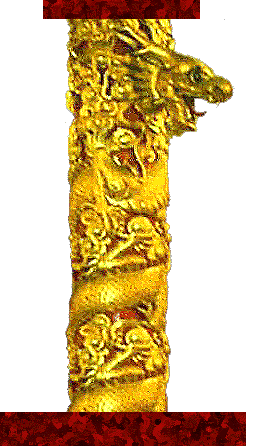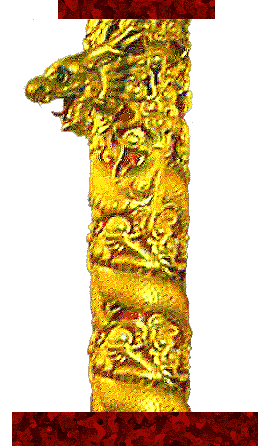| |
(NOTE: Please remember that information in this section dates back to the mid-1980's. Updates are not available at this time.)
Looking back, the Golden Dragon massacre now seems most important as an ominous portent of Asian gang activities in North America and other parts of the world. The claws of its bamboo tigers scratched the surface of what was then tomorrow, but has, soon enough, become today. The national and international news-communication media have finally begun to take notice, in special reports and documentaries, of the spreading menace of Asian crime.
The microcosmic gang world of San Francisco's Chinatown, mutating schoolboys and girls into hardened criminals of great menace to the public at large, thus assumes macrocosmic significance as the best available "textbook" society of its type in the United States. It is worthy of the deepest criminological study. This narrative has endeavored to point out that the present situation has its roots in historical forces that should be taken into account by American law enforcement when dealing with the problem. That it can be handled effectively has been demonstrated.
The Gang Task Force still functions as an elite unit within the San Francisco Police Department. By means of direct contact with the gangs, it has proved its worth time and again by "containing" potentially explosive situations. Recognized for its expertise, it is in constant demand by police departments throughout North America for help in understanding the problems associated with the gangs that have proliferated since the nationwide influx of Southeast Asian refugees began in recent years.
John McKenna continues his work with the Force, his personality still buoyant and vigorous despite the tragic loss of his beloved wife, Julie, to cancer in August 1983. He frequently appears on the podium at national and international conferences on Asian organized crime.
Tim Simmons and Dan Foley also continue in the Dragon Force. Simmons has been promoted from patrolman to inspector, Foley from patrolman to sergeant/inspector.
Hugh Anthony Levine is now in private law practice in San Francisco, specializing in criminal trials and appeals.
A $1,500,000 law suit, filed by two wounded survivors and the families of three of the murder victims against the Golden Dragon Restaurant and its owners, Jack Lee, B. Hong Ng and the Hop Sing Tong, was settled out of court in 1981 for $450,000. The suit charged that the Golden Dragon, knowing itself to be a rendezvous for fei jai, "flying youth" or young gangsters, had taken insufficient security precautions to forestall the massacre.
The Joe Boys are out of business.
Tom Yu appealed his conviction all the way to the United States Supreme Court, which upheld the verdict. He is serving a life sentence in state prison.
Melvin Yu and Peter Ng are serving life sentences in state prison.
Stuart Lin, who got a sentence of 28 years and eight months (later reduced by the state Court of Appeals to 22 years and eight months) is still in state prison. As a personality, he is a "late bloomer." The once "unsteady cadet" speaks and writes excellent English, has commanding presence and great charm and is thoughtful and straightforward. He is exceedingly regretful about his participation as a shooter in the Golden Dragon massacre and seldom speaks of it. He has not only earned his high school diploma while in jail, but also has achieved a junior college degree, with credits toward a full university degree.
Stuart is an accomplished typist who has devoted himself to the acquisition of other skills, among them the repair of sewing machines, which he wanted to learn when he requested a transfer from Galileo to John O'Connell Vocational School at the time he met Dan Foley. He is constantly employed in prison jobs and is knowledgeable in the field of computers. He also captains a soccer team. His close relationship with Dan Foley continues.
Peter Cheung cooperated with police in all he was asked to do. He testified in behalf of the prosecution in all the trials except Stuart Lin's. Sentenced to the California Youth Authority at Stockton for two years, he was released on his 19th birthday, March 30, 1979, after serving less than one year. Following his final testimony in the second Tom Yu trial in February 1980, he returned to San Francisco and realized he had left his "lucky" tie tac at the motel in Santa Barbara. He called Dan Foley somewhat frantically that night to ask the cop to look for it.
Miraculously, Foley found it--under his naked foot--when he went into Peter's former motel room to search. He tucked the tie tac away for delivery later, but Peter needed that good-luck charm more than the cop imagined. A few weeks before his 20th birthday, the boy who had fretted whether he was to be, or not to be arrested, who had fallen asleep, perchance to dream, when the Roadrunner broke down in the Nevada desert, and who then awoke to the nightmare of arrest for his part in the Golden Dragon conspiracy, was driving along Route 580 at night when he ran into car trouble--again. He appeared to have been on his way to Stockton--again--but destiny caught up with him before he got there this time. He set out on foot to look for help and was struck dead by a passing truck. Foley returned the "lucky" tie tac to Peter's sorrowful father.
Mark Chan, the Joe Boy shot down a week after the Golden Dragon massacre, when his friend Michael "Mouse" Lee was killed, recovered from his nine bullet wounds. He attempted to integrate himself into society, but, because of his former reputation as a Joe Boy, was still a target for ambush two years later. Upon advice from the Gang Task Force, Mark went to college in another area and is presently living a productive life.
Steven "Halfbreed" Lee, the vicious boy who tried to chop off a schoolmate's fingers with a paper cutter, later ran afoul of someone very unfriendly, who slammed him in the head with a baseball bat. Halfbreed still roams the streets of Chinatown, but without much awareness of the world around him.
Dana Yu, who got immunity, is now married and has a child. He lives quietly in the East.
Chester Yu spent two years in the California Youth Authority at Stockton. He was released in April 1980. He is working, and resides in another state.
Michael "Hotdog" Louie served his term in state prison for the killing of Kit Mun Louie. Returning to San Francisco, he joined the Ying On Tong and affiliated himself with the Kit Jai Gang, an offshoot of the defunct Dai Ben. He now resides in another city.
Unlike Leslie Russell, the black kid who wanted to be Chinese and is still serving a life sentence in state prison, Japanese-American Eugene Yoshi, a former Joe Boy, listened to Foley's advice ("There's no worthwhile future for a kid who stays in the gangs.") and got out. He is presently a San Francisco police officer and has received numerous commendations and awards for outstanding service.
Carlos Jon, who got immunity, reluctantly traveled to Santa Barbara to testify against Tom Yu. Because of a 10-day delay in the selection of the jury during the first trial, he met some of the Golden Dragon survivors, people whom he had watched paramedics carry to ambulances while he directed traffic on the night of the Golden Dragon massacre. Cool in the beginning, he gave his sentimental streak full reign when he knew them better--dancing with the girls, partying with the guys, and generally having a wonderful time. They did not know who he was, but they found him charming and a great companion. He left Santa Barbara suffering terrible pangs of guilt for having placed the telephone call that had caused them so much agony. He lives now in another state.
The "bad" Wayne Yee served a probationary sentence for his arrest after the dynamite sale. With the dissolution of Chinese Youth Alternatives, he dropped out of political life, is married, and works in the construction business.
Bert Rodriguez is still a tattoo artist and is still married to his kind lady, Sandy. To this day, he kicks himself because he let Wayne Yee talk him out of his suspicions about Tom Yu and the kids at the house that night. He would not only have saved himself a lot of grief, but also might have been a principal contender for the largest reward offered in San Francisco's history.
Gan Wah "Robert" Woo, in May of 1979, got the $100,000 reward offered by Mayor George Moscone in behalf of the City and County of San Francisco, for information leading to the apprehension, arrest and conviction of the perpetrators of the Golden Dragon massacre.
He bought a sports car, had his two gold incisors replaced with white crowns, and gave the balance of the money--$75,000--to his father for the purchase of a family home. Sentenced to one year in County Jail and three years' probation for the Portsmouth Square shootings at Chinese New Year in 1978, he was detained elsewhere for his own safety. Once his cover as star informant in the Golden Dragon investigation was blown, it was considered that he lived on borrowed time until the offending Joe Boys were locked away.
During the period of his detention at various facilities, he maintained a relationship with Tim Simmons which was that of adoptive father and son. Gan Wah served part of his time under the wing of a non-Catholic order of Franciscan Brothers at a monastery in Northern California. While there, he was baptized an Episcopalian and confirmed as such. The Episcopal Diocese of Dallas was helpful in obtaining employment and a home for him in that city in 1979, but he finished his California prison sentence under the unusual circumstance of being a guest in the home of Tim Simmons outside San Francisco. Gan Wah was respectful to the Simmons family, was helpful around the house, and behaved like a gentleman in all respects.
After he left, Gan Wah wrote touching letters to Simmons. They were penned in Chinese and translated by others into English. "I appreciate all the time, effort, care and advice you have given me...I can live the rest of my life in society. I can only thank you with all my heart." He ended his letters with classical Chinese couplets of fastidious correctness appropriate in correspondence addressed to his "Godfather."
He later went to New York, fell in love with a young Chinese lady, and planned marriage. Simmons arranged for him to return to California, to Los Angeles, and found a job for him down South.
All was in readiness. Celebrations were in order to rejoice in the swimming dragon's new life.
Such a strange road he had traveled to reach it!
From upper-class birth as the son of a university professor in Canton; to Mao Zedong's Red Guards at the age of 11; to prison for attempted escape from the army at 12; to successful escape alone across the Pearl River at 13 (a young dragon swimming among sharks); to membership in Hong Kong's notorious 14K Triad at the age of 14; to freedom in the New World at 15; to membership as a Joe Boy in San Francisco's Chinatown; to avoidance of participation in the Golden Dragon massacre; to the $100,000 reward; to the Church; to Dallas; to New York; to the woman he loved--yes, Gan Wah Woo had followed a pathway uniquely his own.
But he never made it to the altar, nor to that westbound plane.
In New York, early in 1983, Gan Wah Woo disappeared.
Where did he go? No one was to know until just before Christmas of 1984.
On Thursday, December 20th, four gangsters entered the Jin Hing jewelry store in Los Angeles' Chinatown, a shop dealing mostly in jade and gold. While three trained weapons on the shopkeeper and his son, the fourth raked armloads of jewelry from a display case.
Two policemen suddenly burst through the door with pistols drawn. A gun battle erupted. The shopkeeper's son crashed to the floor with a non-fatal bullet in his chest. The first cop fell, mortally wounded. The second fell, too, his neck spouting blood, but the injury was not lethal.
When all was over, two of the gangsters lay dead, one of them a gunman and the other the young man whose arms were still laden with the Jin Hing's gold.
The road that young man had traveled was a strange one, indeed. He used to wear his gold in his teeth. He had been so happy to get rid of those old things. He always felt they messed up his smile, and now it was gold that had cost him his life.
Los Angeles Police Lieutenant Dan Cooke told the press that Gan Wah Woo, 25, had belonged to an Asian-American armed robbery gang with ties to San Francisco, Los Angeles, New York and Hong Kong. The "gang" notwithstanding, the swimming dragon certainly did have ties to those four cities.
So Gan Wah was gone, and Peter Cheung. No more "swimming dragon." No more "To-be-or-not-to-be."
But Paul Wada also was gone. And Denise Louie. And Donald Kwan. And Calvin Fong. And Fong Wong.
No more Paul. No more Denise. No more Donald. No more Calvin. No more Fong.
All, in one way or another, were victims of the Golden Dragon conspiracy. All were victims of the bamboo tigers, young warlords of Chinatown. All were victims of the Great, the Long, Wall of silence.
And that wall has, as yet, no end in sight.

| |










